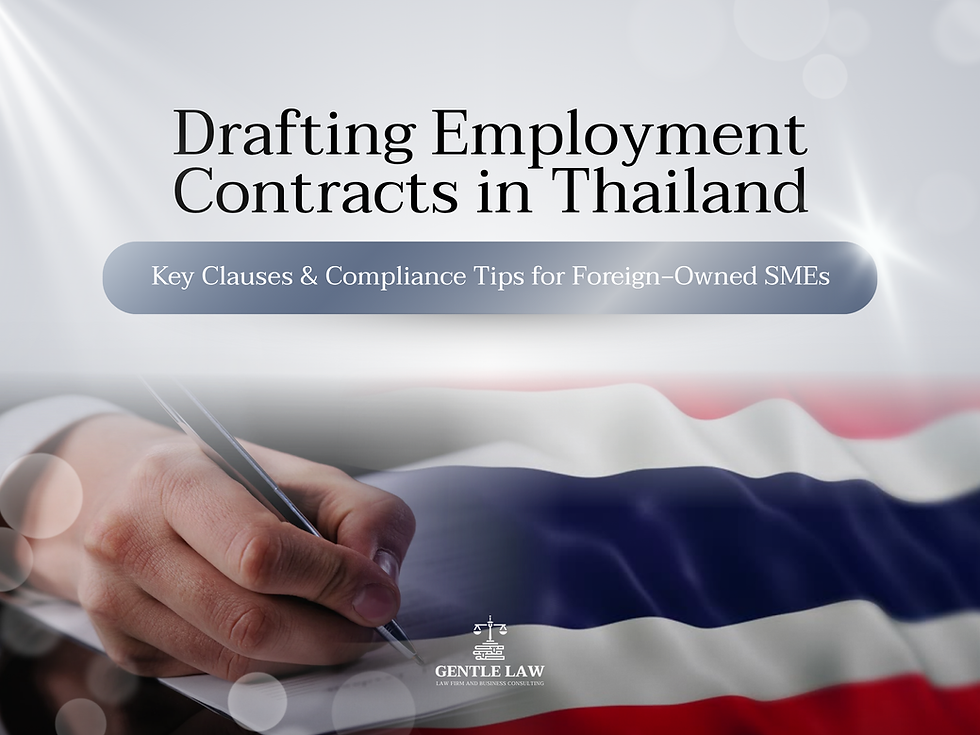Drafting Employment Contracts in Thailand: Key Clauses & Compliance Tips for Foreign‑Owned SMEs
- gentlelawlawfirm
- Aug 7, 2025
- 3 min read

Drafting Employment Contracts in Thailand: Key Clauses & Compliance Tips for Foreign‑Owned SMEs
A well-structured, Thai law-compliant employment contract is essential for any foreign-owned SME operating in Thailand. Employment agreements not only clarify expectations and duties between employers and employees—they also ensure compliance with the Thai Labour Protection Act and mitigate legal and financial risks.
In this guide, GENTLE LAW IBL outlines:
Why properly drafted employment contracts matter
Mandatory clauses under Thai Labour Law
Recommended clauses tailored for foreign SMEs
Common contract pitfalls and how to avoid them
A legally sound contract structure
Why Employment Contracts Matter in Thailand for Foreign SMEs
An employment contract in Thailand:
Defines the rights and obligations of both employer and employee
Serves as a legal foundation to avoid disputes and lawsuits
Ensures full compliance with the Thai Labour Protection Act B.E. 2541
Clarifies disciplinary measures, termination conditions, and severance rights
Without a compliant contract, foreign-owned SMEs face serious risks, including penalties from the Department of Labour, employee claims, and reputational harm.
Mandatory Clauses Under Thai Labour Protection Act
Pursuant to Section 5 and related provisions of the Labour Protection Act B.E. 2541 (1998), an employment contract in Thailand must include at least the following details:
Full names of employer and employee
Employment start date (and end date if fixed-term)
Job title, scope of duties, and primary workplace
Working hours (standard: 8 hours/day, 48 hours/week maximum)
Wages, payment frequency, and payment method
Overtime pay rate (minimum 1.5× standard rate) and terms
Statutory leave (annual leave, sick leave, maternity leave, public holidays)
Confirmation of Social Security registration under the Social Security Act B.E. 2533
Probation period (if any), limited to 119 days
🚫 Failure to include these clauses may result in fines of up to THB 30,000 per omission (Ministerial Regulation No. 14, B.E. 2547).
Recommended Clauses for Employment Contracts in Thailand for Foreign SMEs
To safeguard operational flexibility and long-term risk management, foreign SMEs should consider including the following optional but strategic clauses:
Clause | Purpose |
Confidentiality & IP Assignment | Protect trade secrets and ensure that all intellectual property developed belongs to the company |
Non-Compete / Non-Solicit | Prevent ex-employees from soliciting clients or joining competitors for a defined period post-termination (typically 6–12 months) |
Performance Metrics / KPIs | Tie bonuses or incentive pay to quantifiable business results |
Remote Work & Flexibility | Define terms for hybrid work or fully remote roles to ensure clarity and legal enforceability |
Disciplinary Process | Establish lawful, step-based disciplinary procedures aligned with Thai labour law |
PDPA Data Protection | Comply with Thailand’s Personal Data Protection Act (PDPA) by adding a privacy appendix |
Termination & Severance | Detail statutory notice periods and severance based on length of service (Section 118, Labour Protection Act) |
Common Mistakes When Drafting Employment Contracts in Thailand for Foreign SMEs
Pitfall | Legal/Practical Solution |
Using foreign or generic templates | Localize contracts for compliance with Thai law; offer bilingual (TH-EN) versions to avoid ambiguity |
Ignoring probation period limits | Limit probation to 119 days max and specify clear evaluation criteria |
Failing to specify overtime terms | Always include overtime pay rates, calculation methods, and caps |
Missing PDPA clauses | Add a tailored data-privacy clause aligned with the PDPA |
Vague job descriptions | Include a detailed job scope as a schedule or annexure |
Employment Contract Template Structure for Thailand
Below is a general outline of a compliant employment contract for SMEs in Thailand:
Identification of Parties & Date
Position, Job Description, and Duties
Term of Employment (Fixed-term or Indefinite)
Remuneration & Benefits (Wages, Bonuses, Allowances)
Working Hours, Overtime Conditions
Leave Policy & Public Holidays
Social Security & Insurance
Probation Clause (≤119 days)
Confidentiality & IP Rights
Non-Compete & Non-Solicitation
Data Privacy & PDPA Consent
Disciplinary Procedures
Termination, Notice, and Severance
Applicable Law & Jurisdiction (Kingdom of Thailand)
How GENTLE LAW IBL Supports Foreign-Owned SMEs in Thailand
Our legal team helps you draft enforceable, Thai law-compliant employment contracts tailored for SMEs:
Drafting and vetting bilingual contracts aligned with Thai Labour Protection Act
Advising on probation, severance, and lawful termination clauses
Incorporating IP, confidentiality, and PDPA compliance
Designing HR policy handbooks and remote work policies
Delivering HR training on contract execution and renewals
Final Thoughts
A compliant and well-drafted employment contract isn’t just a formality—it’s a strategic tool that protects your business and aligns your workforce with Thai labour law.
📩 Ready to protect your SME with Thai-compliant employment contracts? Contact GENTLE LAW IBL today for a customized consultation: 👉 www.gentlelawibl.com



